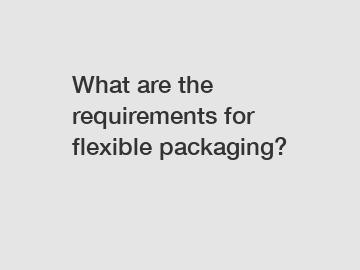What are the requirements for flexible packaging?
What are the requirements for flexible packaging?
Flexible packaging has become increasingly popular in various industries due to its convenience, lightweight nature, and cost-effectiveness. It offers a wide range of benefits, including efficient product protection, extended shelf life, and easy customization. To meet the requirements for flexible packaging, several key factors need to be considered.
One of the most crucial requirements for flexible packaging is its ability to protect the contents from various external factors. Whether it is food, pharmaceuticals, or electronics, the package must provide a barrier against moisture, oxygen, light, and microorganisms. This requirement ensures the safety and quality of the product throughout its lifespan. By incorporating high-performance materials and advanced manufacturing techniques, flexible packaging can offer excellent protection against these external factors.

Moreover, the package should also be durable enough to withstand transportation and handling. It should be resistant to punctures, tears, and other physical damages that may occur during storage or distribution. This durability ensures that the product reaches the consumer in pristine condition, enhancing customer satisfaction and minimizing waste.
Another requirement for flexible packaging is its ability to extend the shelf life of the product. By incorporating barrier properties and innovative technologies, such as modified atmosphere packaging, manufacturers can significantly increase the product's freshness and longevity. This is particularly important for perishable items, such as fruits, vegetables, and meats. Extending the shelf life reduces food waste and allows for wider distribution, benefiting both producers and consumers.
Additionally, customization options are essential in flexible packaging. Different products require different packaging designs, sizes, and functionalities. Whether it is a stand-up pouch, a resealable bag, or a spouted pouch, flexible packaging can be tailored to meet specific requirements. This level of customization enhances brand recognition, shelf appeal, and overall consumer experience.
Furthermore, the sustainability aspect of flexible packaging cannot be overlooked. With increasing concerns about environmental impact, sustainable packaging solutions are gaining popularity. Flexible packaging offers several advantages in this regard. It is lightweight, reducing transportation emissions, and requires less energy and resources to manufacture compared to rigid packaging. Additionally, flexible packaging materials are often recyclable or made from renewable sources, further reducing their ecological footprint.
In conclusion, the requirements for flexible packaging encompass its ability to protect the contents, withstand physical damages, extend the shelf life, provide customization options, and adhere to sustainable practices. By meeting these requirements, flexible packaging offers numerous benefits to various industries. Its convenience, cost-effectiveness, and ability to meet consumer demands make it an ideal packaging choice for many products. With ongoing advancements in materials and technologies, flexible packaging will continue to evolve and play a significant role in the future of packaging.
The company is the world’s best Retort Pouches for Sale, custom flat bottom pouches, custom pouches for health & beauty supplier. We are your one-stop shop for all needs. Our staff are highly-specialized and will help you find the product you need.
269
0
0

Comments
All Comments (0)